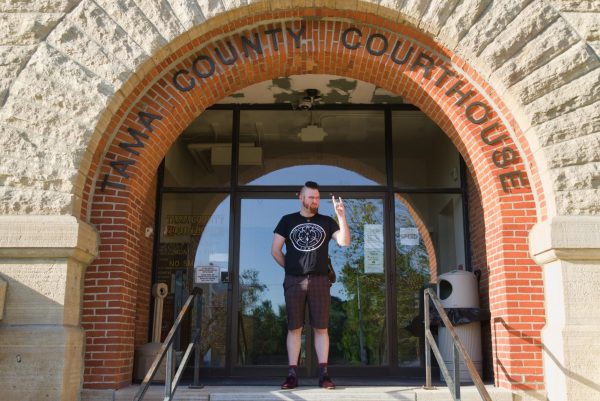On Sept. 3rd, 2024, Tama County Supervisors deliberated over a request to transform the Tama County Courthouse lawn into a stage for the Satanic Temple Iowa to host their first public reading: a two-day marathon on John Milton’s 1667 epic, “Paradise Lost”, a core text of the Temple, according to co-organizers and Ministers of Satan Mortimer Adramalech and Toki Leonard.
Members of the Temple said that they intended to host the event at the Iowa State Capitol in Des Moines. Instead, they were met with Governor Kim Reynolds’ change in event policy the day their event was added to the calendar. According to the new policy, organizations are only allowed one event per calendar year at the building, preventing multi-day events of any kind.
Leonard said the new event policy limits flexibility around events for organizations like Planned Parenthood and One Iowa. For Leonard, activism is an important part of their satanist practice.
“Iowa is a vast state,” Leonard said. “For me, satanism is an alternative to atheism. As someone assigned female at birth, I find comfort in the scientific angle the Satanic Temple embodies.” According to the Temple’s website, they do not believe in the existence of Satan or in the supernatural.
The group chose the Tama County Courthouse as their alternative location because of its central location within Iowa. Adramalech said that Assistant County Auditor Karen Rohrs asked him if the event would be like a “Bible reading.” He said that he told her the reading is similar in nature to Bible-focused events like the annual Iowa 99 County Bible Reading Marathon.

On Dec. 14th, 2023, the Temple displayed a Baphomet altar in the Capitol, which garnered significant backlash. The display was in accordance with state rules allowing religious displays during the holiday season. In reaction, a Mississippi man destroyed the display beyond repair, and was charged with a hate crime.
The Toledo reading of “Paradise Lost” reading was not without its own backlash.On Monday, Sept. 16th, 2024, the first day of the event, the Solid Rock Bible Church of Toledo hosted their own reading of the Bible in protest. Their group did not receive permission from Tama County and the City of Toledo to hold a reading.
Adramelech and Leonard said that the main goal of the reading was to promote the importance of literacy and cultural pluralism.
To advertise the event, group members placed a variety of posters advertising the reading on college campuses in the surrounding area. Adramalech said that he placed posters around Grinnell’s campus because he knew about the College’s Religious Studies Department, and thought it would be a relevant event for students to attend.
Like Adramalech and Leonard, Sherif Abdelkarim, assistant professor of English, said he is drawn to the literary value of “Paradise Lost.”
“I think it’s a political move to host [the marathon] in Tama. I think Milton would have at least recognized the political power of literature, said Abdelkarim. “John Milton himself is quite an iconoclast. I’d consider him a radical.”

Earlier Tuesday morning, the group said that they were surprised to finish their reading of “Paradise Lost” at the beginning of their scheduled second day. Around 5 p.m. that same day, they were well into another one of their denomination’s core texts, Anatole France’s “The Revolt of the Angels.”
Leonard compared the two core texts and said that their differences can be attributed to the different time periods in which they were written, but both are fundamentally humanistic approaches to interpreting Satan as an icon.
Both Leonard and Abdelkarim said that they particularly value the Romantic interpretations of the text.
Abdelkarim said that during the Romantic period, Satan was seen as the hero. He said he categorizes “Paradise Lost” as a love story. He added, “It’s a love story between God and Jesus. Between God and man. Definitely one between Adam and Eve. Finally, it’s a love story between God and Satan, and Satan’s struggle is really one of self-love.”
Abdelkarim said, “If you love yourself, if you’re satisfied with yourself, you’re going to be a lot more capable of empathy towards others.” He added, “There’s a lot of envy in “Paradise Lost,” and there’s a lot of hatred, if you want to call it hatred, more like a child’s outburst toward God through Satan.”
Echoing the ministers, Abdelkarim said, “What’s beautiful about “Paradise Lost” is that it’s accessible to everybody. It’s not just accessible to Christians.”
Abdelkarim said that ultimately, Milton is unavoidable. He said that the power of literacy remains strong, and is especially valuable on college campuses. “The text is more than just a literary epic—it’s really a philosophical treatise that reflects the importance of literacy across cultural time and space.”
Editor’s Note: This story has been updated to accurately reflect the names of the organizations that Leonard has organized with.




















































